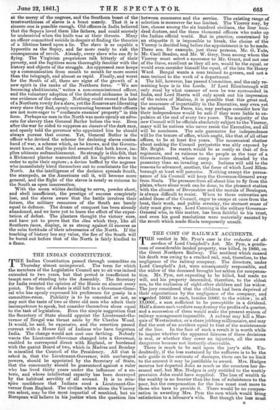THE INDIAN CONSTITUTION.
THE Indian Constitution pa'ssed through committee on Thursday almost unimproved. The term for which the members of the Legislative Council are to sit was indeed extended to two years, but that period is insufficient to tempt men of standing into the Assembly. The Secretary for India resisted the opinion of the House on almost every point. The form of debate is still left to a Governor-Gene- ral who has openly expressed his preference for gossip in a committee-room. Publicity is to be conceded or not, as may suit the taste of two or three old men who admit their incompetence to speak, but consider themselves alone equal to the task of legislation. Even the simple suggestion that the Secretary of State should appoint the Lieutenant-Go- vernor of Bengal was thrust aside by Sir Charles Wood. It would, he said, be expensive, and the assertion passed current with a House full of Indians who have forgotten India. The change would not cost one farthing. Nobody wants the Lieutenant-Governor changed into a Governor, enabled to correspond direct with England, or burdened with the quaint Board of two, which in Madras and Bombay is miscalled the Council of the Presidency. All that is asked is, that the Lieutenant-Governor, with unchanged powers, should be appointed by the Secretary of State, that the community should be guaranteed against a ruler who has lived thirty years under the influence of a co- terie, and whose intellectual capacity has been destroyed by the habitual servility of all around. It is to rein- spire confidence that Indians need a Lieutenant-Go- vernor from England. The civilian whom alone the Viceroy can select, may be the most impartial of mankind, but no European will believe in hie justice when the question lies between commerce and the service. The existing range of selection is moreover far too limited. The Viceroy may, by law, choose among the six hundred civilians, the four hun- dred doctors, and the three thousand officers who make up the Indian official world. But in practice, constrained by an etiquette it is impossible to break, the choice of the Viceroy is decided long before the appointment is to be made. There are, for example, just three persons, Mr. G. Yule, Mr. Cecil Beadon, and Mr. W. Grey, from among whom the Viceroy must select a successor to Mr. Grant, and not one of the three, excellent as they all are, would be the equal, or would even consider himself the equal, of the late Sir Henry Ward. Bengal wants a man trained to govern, and not a man trained to the work of a department. The bill, however, has passed Committee, and the only re- maining hope is in the Lords. If Lord Ellenborough will only recal by what manner of men he was surrounded in India, and Lord Harris will only speak out his impression of the rulers of Madras, it is possible that this great end, the assurance of impartiality in the Executive, may even yet be attained. The Peers, too, may perhaps consider how far their independence would be safe if they were liable to ex- pulsion at the end of every two years. The majority of the new Council will be officials absolutely subject to the Viceroy, many will be natives who never resist the Executive, and all will be nominees. The sole guarantee for independence will be the tenure of office, which ought, like that of all other offices, to be at least five years. The nonsensical chatter about making the Council peripatetic was ably exposed by Mr. Bright. Its march would be as costly as that of five regiments, and as ruinous to the people as the tour of a Governor-General, whose camp is more dreaded by the peasantry than an invading army. Indians will add to the reasons he advanced, another, the force of which Lord Ellen- borough at least will perceive. Nothing except the perma- nence of his Council will keep the Governor-General away from Simla. The pressure from all about him to fly from the plains, where alone work can be done, to the pleasant station with the climate of Devonshire and the morals of Boulogne, is always difficult to resist. When to these entreaties are added those of the Council, eager to escape at once from the heat, their work, and public scrutiny, the sternest sense of duty must give way. Lord Canning is the solitary Governor- General who, in this matter, has been faithful to his trust, and even his good resolutions were materially assisted by the revolt which made Simla temporarily unsafe.






























 Previous page
Previous page